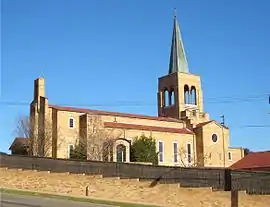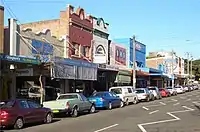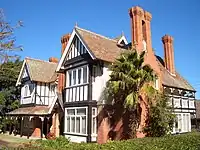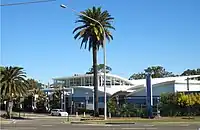| Penshurst Sydney, New South Wales | |||||||||||||||
|---|---|---|---|---|---|---|---|---|---|---|---|---|---|---|---|
 St Johns Anglican Church, King Georges Road | |||||||||||||||
| Population | 12,786 (2016 census)[1] | ||||||||||||||
| Established | 1884 | ||||||||||||||
| Postcode(s) | 2222 | ||||||||||||||
| Elevation | 56 m (184 ft) | ||||||||||||||
| Location | 17 km (11 mi) south-west of Sydney CBD | ||||||||||||||
| LGA(s) | Georges River Council | ||||||||||||||
| State electorate(s) | |||||||||||||||
| Federal division(s) | |||||||||||||||
| |||||||||||||||



Penshurst (/pɛnzhɜːrst/) is a suburb in southern Sydney, in the state of New South Wales, Australia. Penshurst is located 17 kilometres south of the Sydney central business district and is part of the St George area.
Penshurst features low to medium-density housing.
History
Penshurst was named after Penshurst, Kent, England. Originally part of the land grant to Robert Townson (1763–1827), the land was acquired in 1830 by John Connell, who left it to his grandsons J.C. and E.P. Laycock. Connell's Bush was subdivided by the Laycocks and the western part sold to Thomas Sutcliffe Mort.
The early work in the area was timber-cutting and small farming. The railway station opened 17 May 1890.[3] A large portion of Penshurst located south of the railway line is referred to as the MacRae's Estate, as it was once owned by the MacRae family. This particular area is now between Laycock Road and Grove Avenue, and Hillcrest and Railway Parade. The original homestead is still present on Laycock Road, along with a caretakers house for the stables. McRaes Reserve used to have a river running through it and the path of that river is now replaced with an underground rainwater system.
Heritage listings
Penshurst has a number of heritage-listed sites, including:
- 663-665 King Georges Road: West Maling[4]
- Laycock Road: Penshurst Reservoirs[5]
Commercial area
The main shopping centre is located around Penshurst railway station on Penshurst Street, Bridge Street and The Strand. Commercial developments are also found along Forest Road and King Georges Road. The Penshurst RSL Club is a centre of social activity. The area also contains The Gamesmen Store and Museum, dedicated to video games since 1982.[6]
Transport
Penshurst railway station is on the Illawarra Line of the Sydney Trains network. It is approximately 27 minutes from Sydney Central via train. The main roads through Penshurst are King Georges Road and Forest Road. U-Go Mobility also operates bus services 941 and 943 in Penshurst.[7]
Places of worship
- St Declan's Roman Catholic Church
- St John Anglican Church
- St Andrew Presbyterian
- Penshurst Uniting Church
- Penshurst Mosque (Australian Bosnian Islamic Society)
- Penshurst Jehovahs Witnesses Kingdom Hall
- Penshurst Assemblies of God Church
- Revival Life Centre
- Penshurst General Church of New Jerusalem
Schools
- George's River Girls High School
- Marist College Penshurst
- St Declans Catholic Primary School
- Penshurst Public School
- Penshurst West Primary School
- Hurstville Grove Infants School
Sport and recreation
Penshurst local attractions include an Aquatic Centre, a park and tennis courts. Penshurst RSL Junior Rugby League Club, part of the St. George District Junior Rugby League competition, is a rugby league club that operates from HV Evatt Park in nearby Lugarno.
Penshurst has a local cricket club and play in the St George District Cricket Association and have been established for over 50 years.
They are based at Olds Park which also includes their soccer club.
Penshurst Park and Hurstville Aquatic Leisure Centre are located on King Georges Road.
Parks:
Demographics
In the 2016 Census, there were 12,786 people in Penshurst. The most common ancestries were Chinese 20.4%, English 13.2%, Australian 12.1%, Nepalese 5.9% and Irish 5.3%. 47.4% of people were born in Australia. The next most common countries of birth were China 13.8%, Nepal 6.6%, Hong Kong 2.5%, Philippines 2.2% and India 2.2%. 42.2% of people spoke only English at home. Other languages spoken at home included Mandarin 12.0%, Cantonese 9.3%, Nepali 6.9%, Greek 3.5% and Arabic 2.9%. The most common responses for religious affiliation were No Religion 25.2%, Catholic 23.3%, Anglican 8.4% and Hinduism 8.1%.[1]
Notable residents
- Ruby Olive Boye-Jones (1891–1990), coastwatcher[8]
- Sue Denison, received the Medal of the Order of Australia for services to nursing as a nurse practitioner, and services to the Nundle district
- Colin Fraser, rugby league player
- John Patrick Hamilton, Victoria Cross recipient
- Jack Holland, rugby league player
- Jock Marshall (1911–1967), professor of zoology[9]
- Jack McCormack, rugby league player
- Arthur McGuinness (1878–1970), school teacher and union leader[10]
- Chris Minns (born 1979), 47th Premier of New South Wales grew up in Penshurst
References
- 1 2 Australian Bureau of Statistics (27 June 2017). "Penshurst (State Suburb)". 2016 Census QuickStats. Retrieved 11 April 2018.
- ↑ A pictorial Guide to Identifying Australian Architecture, Apperly, Angus and Robertson, 1994
- ↑ Book of Sydney Suburbs, Frances Pollon (Angus and Robertson) 1990, page 205
- ↑ "West Maling (Revival Life Centre)". New South Wales State Heritage Register. Department of Planning & Environment. H00269. Retrieved 18 May 2018.
 Text is licensed by State of New South Wales (Department of Planning and Environment) under CC-BY 4.0 licence.
Text is licensed by State of New South Wales (Department of Planning and Environment) under CC-BY 4.0 licence. - ↑ "Penshurst Reservoirs". New South Wales State Heritage Register. Department of Planning & Environment. H01330. Retrieved 18 May 2018.
 Text is licensed by State of New South Wales (Department of Planning and Environment) under CC-BY 4.0 licence.
Text is licensed by State of New South Wales (Department of Planning and Environment) under CC-BY 4.0 licence. - ↑ "The Long Way Is The Short Way: The 30 Year Legacy Of The Gamesmen". 28 September 2012.
- ↑ "Punchbowl Bus". Punchbowl Bus Company.
- ↑ Powell, Alan (2007). "Boye-Jones, Ruby Olive (1891–1990)". Australian Dictionary of Biography. National Centre of Biography, Australian National University. ISSN 1833-7538. Retrieved 20 April 2015.
- ↑ Warren, James W. (2000). "Marshall, Alan John (Jock) (1911–1967)". Australian Dictionary of Biography. National Centre of Biography, Australian National University. ISSN 1833-7538. Retrieved 20 April 2015.
- ↑ Mitchell, Bruce (1986). "McGuinness, Arthur (1878–1970)". Australian Dictionary of Biography. National Centre of Biography, Australian National University. ISSN 1833-7538. Retrieved 20 April 2015.
33°57′56″S 151°5′42″E / 33.96556°S 151.09500°E